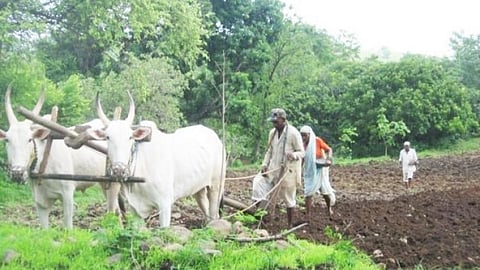
- Topics
- Feature
- Opportunities & Events
- About
- Hindi Portal
- Data
- Topics
- Feature
- Opportunities & Events
- About
- Hindi Portal
- Data

On the eve of the World Water Day, Watershed Organisation Trust (WOTR), made a presentation to the members of the Maharashtra Legislature. The presentation was a part of an event titled Tackling Climate Change in Maharashtra that was presided over by the chief minister, Devendra Fadnavis.
Speaking about the flagship programme of the state government, Jalyukt Shivar Abhiyan (JSA), Crispino Lobo, managing trustee and cofounder WOTR, said that its fundamental principles were sound and aligned towards achieving its objective of making Maharashtra drought free. He, however, cautioned the government that the JSA faced a major threat in climate change. He said that irregular and intense rainfall would lead to “intense and high volume runoffs. This will affect all the major activities being implemented--nalla deepening and training; bandharas; farm bunding and farm ponds”.
Lobo explained that climate resilience meant that people were better able to cope with and adapt to climate-induced shocks (unseasonal and intense rainfall, poor rains and long dry spells, storms, rising temperatures, etc), reduce losses, maintain productivity and capitalise on opportunities that climate change offered. He then went on to outline ways in which the JSA could be made climate resilient and said that these strategies came from WOTR’s own experience of over 25 years in the field and from lessons drawn from a joint study with Action on Climate Today under the UK-India Programme.
Speaking at the event at the Central Hall, Vidhan Bhavan, Mumbai, Lobo explained in detail how JSA could be climate-proofed. He pointed out that:
Touching upon the importance of water conservation, he highlighted that 84 percent of water supply went towards agriculture. “So we need to move to adaptive sustainable agriculture. And water budgeting is the key to this. Based on this, we plan the cropping pattern and promote practices that improve soil health and increase water use efficiency (more crop per drop)," Lobo added.
Connecting the work on climate resilience to the critical issue of water security, Lobo said that WOTR had launched a pilot water stewardship campaign in106 villages where communities were being motivated to implement the key principles of the Maharashtra Groundwater Management Act. He highlighted some of the results as:
Along with the message on water conservation, Lobo also spoke about the efforts in climate-smart agriculture, where WOTR, in collaboration with India Meteorological Department (IMD), Central Research Institute for Dryland Agriculture (CRIDA), the Mahatma Phule Krishi Vidyapeeth (MPKV) and the Marathwada Agriculture University, have been giving weather based and crop-specific advisories to farmers since the last five years.
“If we want to make villages in Maharashtra climate resilient, there is no alternative to watershed development and using available water efficiently,” concluded Lobo.